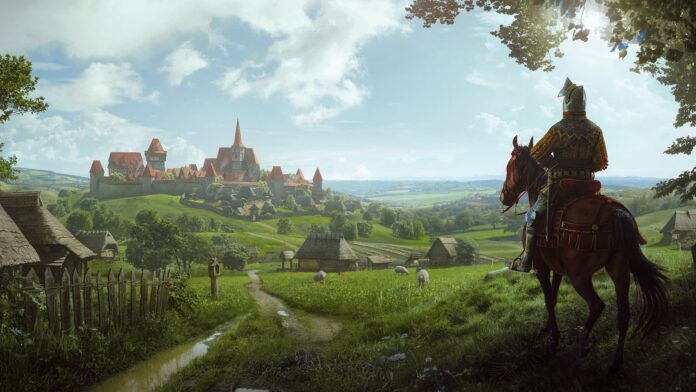Manor Lords, out today, is a city-building and strategy game that focuses on sandbox gameplay and intimate historical details. Yes, this means authentic building designs, workplaces, and even fashion. However, Manor Lords, goes several steps further with its authenticity – your people will starve if you don’t adequately prepare for the colder months too.
Your first year in game will be the hardest – luckily, we’ve collected some top-tier advice from other wizened barons and traveling merchants to help new players with their early settlements and ensure stability in the years to come.
Location, Location, Location
Each start in Manor Lords is unique – every time you begin a new game, you could end up in any one of eight regions that make up the game’s fictionalized slice of medieval Germany. The resources around you will also change. Even if you roll the same region several times in a row, the nearby resources will always spawn differently so you may start with rich sources of Iron or Clay in one game, and another may see you awash in berries or fertile fields, which are paramount to keeping your villagers fed.
Planning around what you have is key, and will affect everything from what industries you should focus on first, to what development branches you invest in. If you have a rich source of iron, building a Bloomery and Smithy will let you create lucrative trade items like Tools, and you’ll want to choose a Charcoal Kiln, and the Deep Mining upgrades. The latter ensures you never run out of raw materials. Other resources have their own strategies as well so make sure you look at all your options.
Location also has a more grounded meaning – the time a citizen takes to travel between their house and place of work, or the time it takes oxen to lug that heavy log from the pile to the building site can have a profound effect on the game’s pacing and logistics.
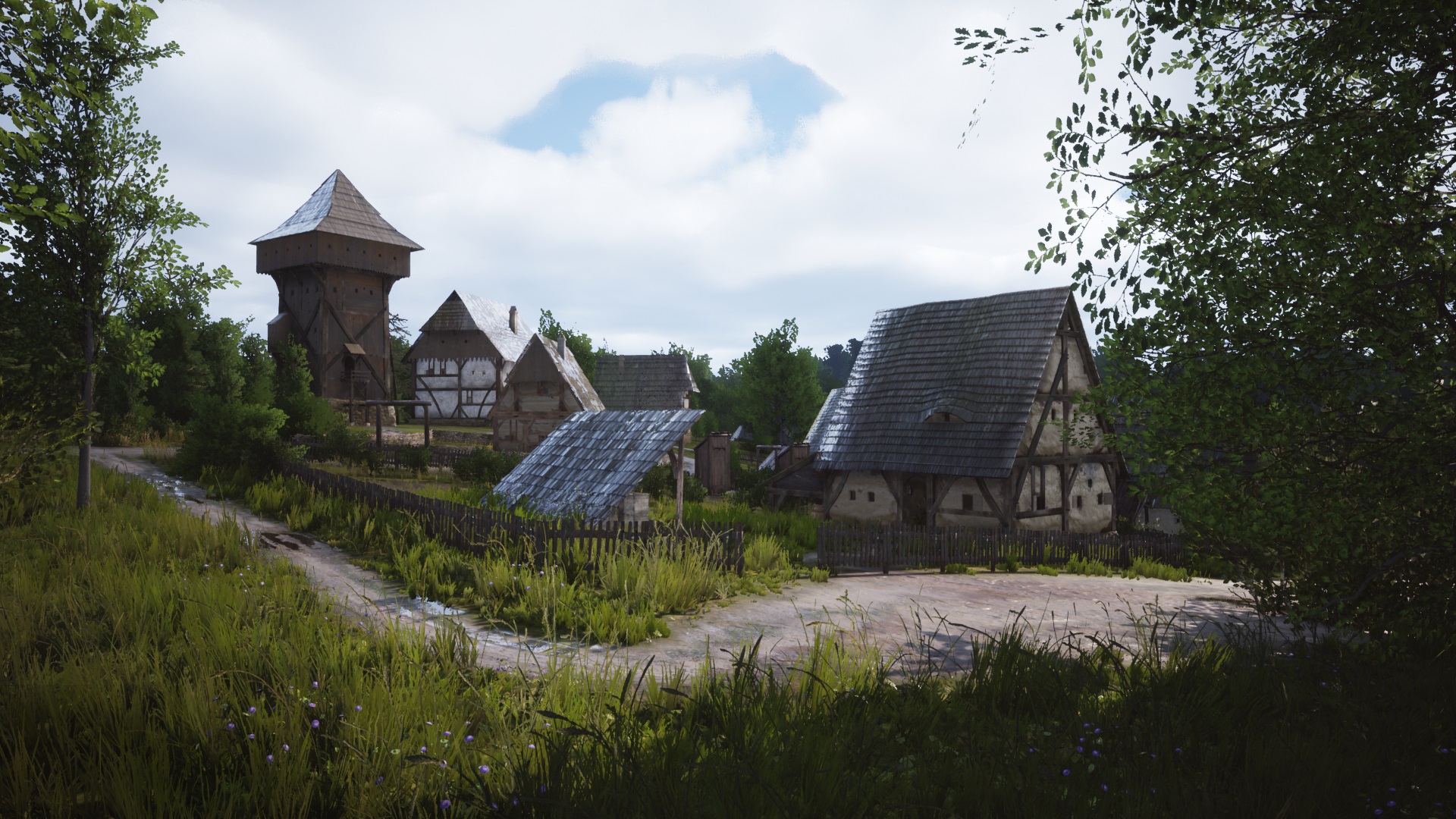
Food & Fire(wood)
Manor Lords works on a system of “needs”- access to water, food variety, and so on. If you meet the needs of one tier of “Burgage Plot” (Manor Lords’ name for a house), then you can upgrade it to a higher tier, which will have more complex needs. Meeting these needs keeps your citizens happy and stops them from leaving. But regardless of tier, two things are universal – access to food and firewood.
While higher-tier housing likes to see a variety of food at the market, as long as they have enough to feed themselves (and access to water), they’ll be happy.
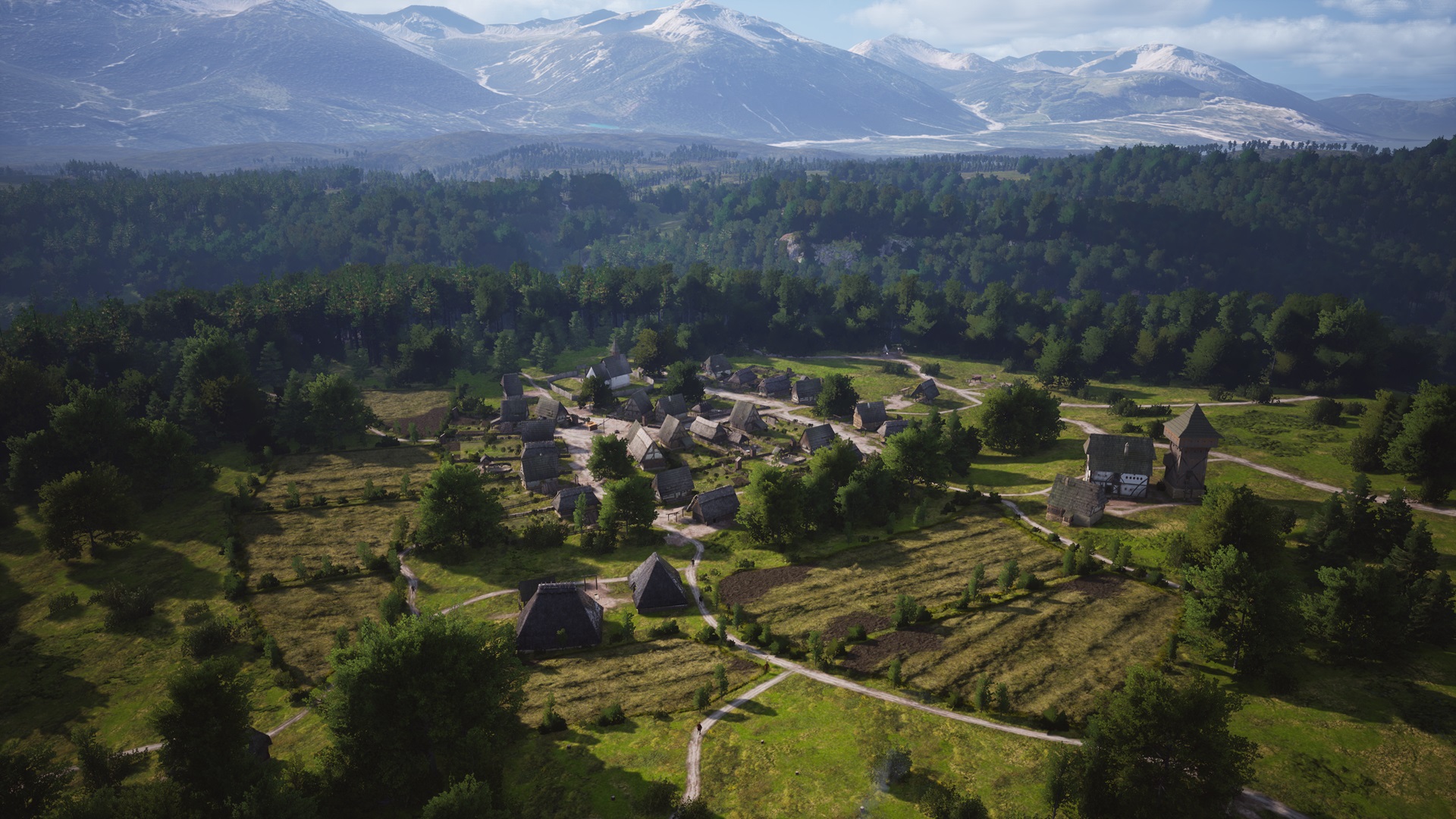
There are a number of ways of meeting your initial food requirements:
- You will likely start with a deposit of berries and/or a deer herd nearby. Build the Forager’s Hut or a Hunting Lodge respectively to start harvesting.
- You will start with some initial funds in your village’s coffers—these can be spent on backyard extensions like a Chicken Coop or a Vegetable Garden. We suggest choosing the Chicken Coop first, as it starts generating eggs right away and is not dependant on free labour.
- Micro-management can be your friend if you’re short on spare families. As berry deposits are seasonal, consider having the same family harvest berries in the summer, and hunting deer in the winter.
After your first year, you’ll want to think about farming – there is an overlay to see how fertile the surrounding land is, the more ‘+’ symbols the better. It might be worth looking at this when you first start the game, and pick a spot nearby to come back to later. You can border it with roads (or just put down a field) and then spin-up farming when you have the population and capacity to go down this route.
Firewood is a lot simpler to sort out. Your citizens need to light their fires and stay warm, with firewood consumption doubling in winter. You will need a Woodcutter’s Lodge with a family assigned to it so they can generate firewood for the village. Excess firewood will get stored in your Storehouse, and the Market will hand out firewood to the citizens.
At any point you can check out how much food and firewood you have in reserve by looking for the handy barrel symbol along the top info panel — it shows you the how many months your citizens can survive if everything grinds to a halt. Hover over it with the mouse, and it will break things down separately into fuel and food reserves.
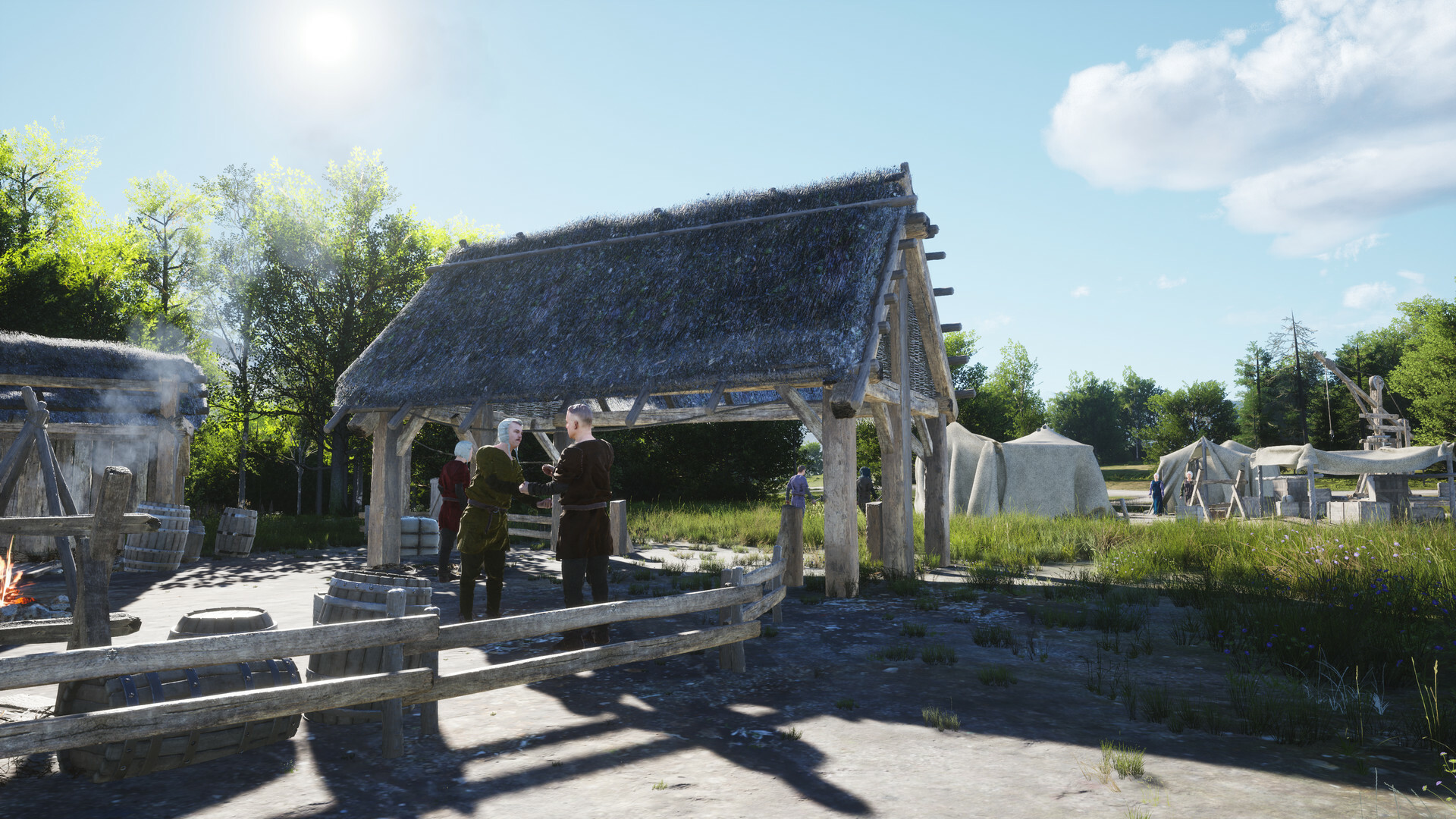
In This Economy?
Trading is crucial in Manor Lords. You’ll need to import goods to meet any shortcomings; perhaps you need more Hides, or you need to import Iron because there are no deposits near your starting settlement. You’ll also need funds to hire more work animals or build backyard extensions.
Luckily, you exist within a vast civilized polity, and wandering traders feel safe enough to travel up and down the King’s Road peddling wares and looking for opportunities to turn a profit.
Once you’ve met your initial needs and identified your starting industry, it’s time to start making some money! You’ll want to build a Trading Post and then assign a family to work there. By this point, you’ll have probably expanded beyond the initial five families you started the game with and have enough provisions to keep them happy.
Identify what you have in excess, or at least what you can afford to sell to gain some short-term funds. Hides, while needed to promote Burgage plots to tier 2, are not an essential requirement, so you could sell early harvests of Hides. Certain “high-tier” goods require you to pay a large sum of money to establish a trade route, so selling lower-tiered items is easier provided you have enough excess to earn what you need. There is also a development tree upgrade that helps with trading.
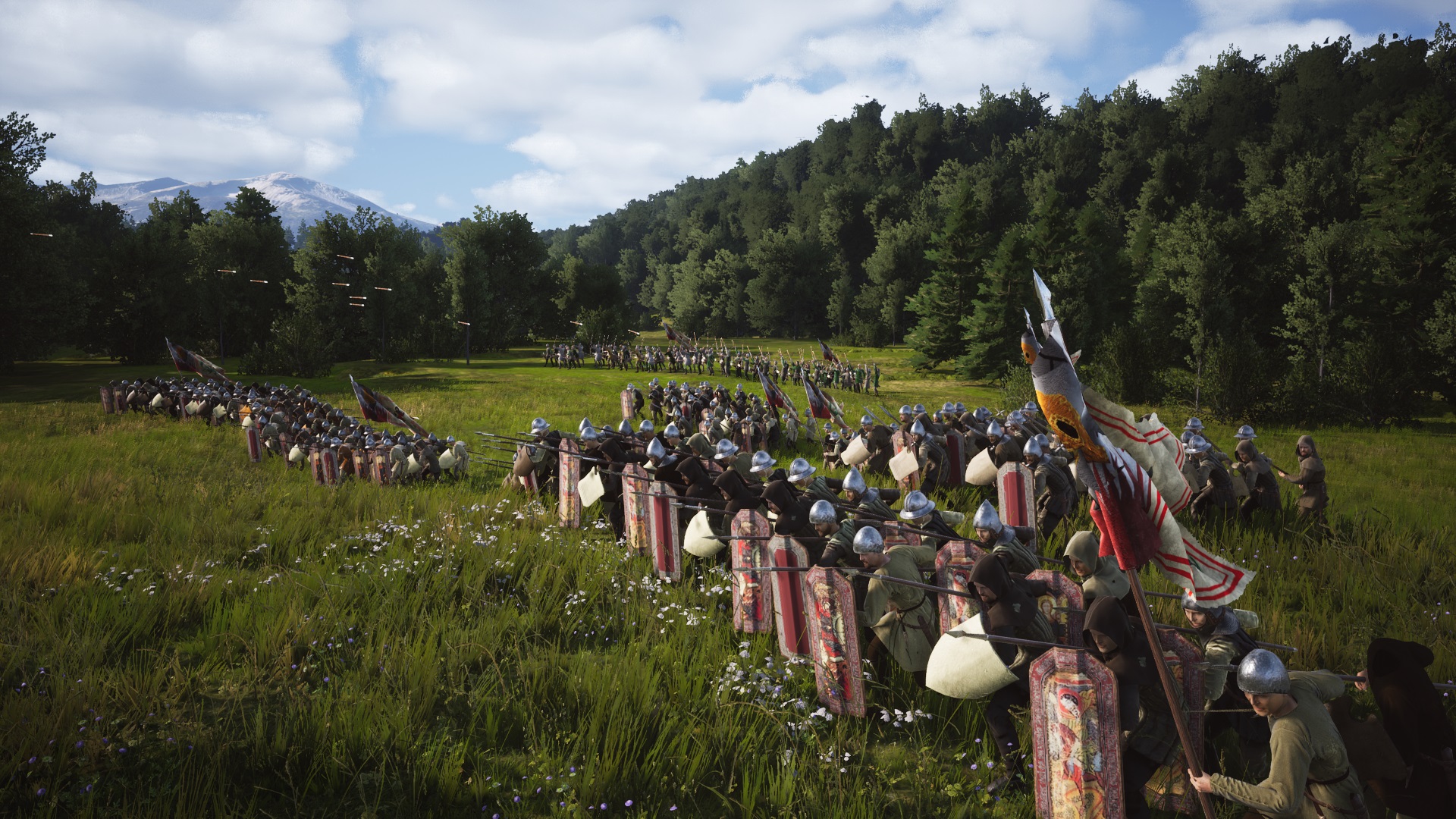
Law & Order
Your lands are not completely safe – a powerful rival lord will try and stake his claim across the other regions, and roaming bandits will be a constant nuisance. Once you’ve survived your first year, you’ll want to turn your eyes towards the surrounding countryside and establish your right to rule. Some final tips to keep in mind:
- The default scenario includes a bandit attack that, depending on the settings, will not kick in for at least two years, which gives you time to prepare.
- Other bandit camps dotted around the map won’t attack you directly, but while they exist they will periodically steal things from you.
- You will see the rival lord marching around with his armies. You don’t need to worry about them until you’re ready to challenge him for real.
Your first year in Manor Lords will be the hardest, but once you’ve survived there is plenty more to do and see. You can explore farming, other industries, and start arming your militia to take on the threats around you. These lands are yours to claim, my Lord – good luck!
Manor Lords is available on the Microsoft Store (Game Preview) and day one in PC Game Pass.


Manor Lords (Game Preview)
Hooded Horse
This game is a work in progress. It may or may not change over time or release as a final product. Purchase only if you are comfortable with the current state of the unfinished game.
Manor Lords is a strategy game that allows you to experience the life of a medieval lord. Grow your starting village into a bustling city, manage resources and production chains, and expand your lands through conquest.
Inspired by the art and architecture of late 14th century Franconia, Manor Lords prioritizes historical accuracy wherever possible, using it to inform gameplay mechanics and visuals alike. Common medieval tropes are avoided in favor of historical accuracy, in order to make the world feel more authentic, colorful, and believable.
ORGANIC CITY BUILDING
Manor Lords provides a gridless city-building experience with full freedom of placement and rotation. Building mechanics are motivated by the growth of real medieval towns and villages, where major trade routes and the landscape influenced how settlements shaped and developed.
– Spreading outward from a central marketplace, build your residential, commercial, and industrial districts following the natural lay of the land. Establish farms based on soil fertility, position hunting grounds according to animal populations, and ensure access to adequate resource deposits and forests to provide the raw materials needed for growth.
– Assign areas for housing and watch your residents build their homes in accordance with the historical burgage plot system. Each region will be subdivided based on your roads and the allotted space, and homes will scale accordingly.
– Build extensions behind larger homes to generate income and resources that would not otherwise be available. Homeowners don’t just pay taxes – they grow vegetables, raise chickens and goats, and otherwise supply themselves and other townsfolk with essential needs beyond what your managed farms, pastures, and industries can provide.
– Guide your settlements through the unique demands and opportunities of each season, enjoying the bounty brought by spring rains and preparing for the harsh snows of winter.
RESOURCE MANAGEMENT
From boots to barley and hides to honey, Manor Lords features a great variety of goods fitting of the era. Materials need to be transported and processed into finished products through production chains, and you must balance the basic needs of your people against the desire to produce luxury items to ensure happiness, manufacture trade goods for export, or forge arms and armor to aid in your conquests.
– Resources are littered across the map, encouraging you to expand and establish multiple specialized settlements. Extract valuable ores from your mining colonies, while villages devoted to agriculture, herding, or hunting supply the grains and meats needed to feed your growing population.
– Unchecked expansion will have a direct effect on the environment. Herds of deer will migrate away from encroaching civilization, lack of crop rotation will worsen soil fertility, and cutting down too many trees will result in deforestation.
– Sell surplus goods to traveling merchants or establish trade routes of your own. Manufacturing and exporting quality goods will provide wealth to upgrade your city, pay taxes to your liege, hire mercenaries, and unlock technologies for new industries, products, and tools.
MEDIEVAL WARFARE
Yours is but a small parcel of land in a vast territory, and the competing ambitions between you and neighboring lords will inevitably lead to conflict. Lead your people into battle, not as expendable units to be easily replenished, but as your beloved loyal subjects where every death is a cost worth considering.
– Train a retinue of skilled warriors to fight battles alongside the levies you raise from the town militia. At times these soldiers will be needed to crush rebellions or suppress banditry, and at other times you will lead your men into battle to conquer or defend territory. When needed, mercenaries are a costly option to bolster your ranks.
– A robust diplomacy system will allow you to communicate with other lords, using influence or threats to sway their actions. These competing lords have their own goals and will seek you out as well, and your response to their offers or insults can mean the difference between war and peace.
– Command real-time tactical battles, taking into consideration fatigue, weather conditions, and equipment. Position your troops wisely – a smaller force can defeat a larger enemy, if commanded well.
– Feel the cost of battle, even in victory, as each fallen soldier represents a lost person from your city. A pyrrhic victory can spell economic doom, or a winter of rationing food and firewood.
news.xbox.com

